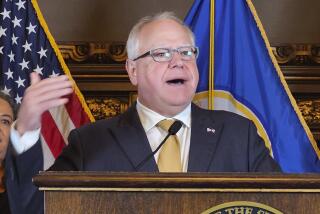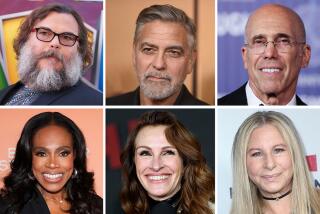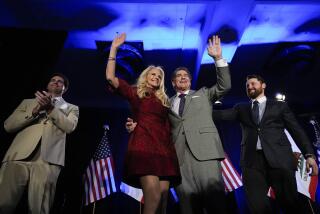Trouble, Risk Cited : Consultants Avoid Race for President
WASHINGTON — Gary Hart is running against them.
Hollywood makes movies vilifying them.
Voters in New Hampshire and Iowa, according to research by a Washington think tank, worry they have corrupted the political process.
This presidential season, political consultants--the speech coaches, television directors, pollsters and image conjurers who flank the candidates--are coming under mounting criticism as democracy’s profiteers, subverting the integrity of elections.
“I don’t listen to (candidates) on TV,” a nurse from Davenport, Iowa, told researchers from the Roosevelt Center for American Policy Studies, “because it’s prepackaged and its hogwash. It’s some campaign manager’s idea.”
“They’re brainwashing us,” another said.
Difference in Influence
Paradoxically, most experts say that political consultants have less influence on presidential races than on any other electoral contest.
In fact, many of the most prominent media consultants consider presidential campaigns bad for business and they stay well away.
The most important election in America, it seems, is too much trouble, too risky and too often ends in debt. It consumes time that a consulting firm might otherwise devote to those races in which there is real money to be made, a tight Senate contest or a particularly nasty governor’s race, for instance.
And most consultants feel that they have less influence in presidential campaigns because television ads are less important, whereas organization and the press count more.
“You just don’t make a lot of money in presidential campaigns,” said David Heller, who was finance director for Gary Hart’s 1984 campaign and is now an editor of Campaigns & Elections, a newsletter for consultants.
Sitting Out Primaries
A presidential campaign is an opportunity for new consulting firms “to get a reputation in a hurry,” said media consultant Robert Squier of the firm Squier & Askew, “but it just doesn’t fit a company that has a lot of other business.” Squier’s firm, rated the top Democratic media consultant by the respected National Journal, is sitting out the primaries to work on Senate and governor’s races.
The result: The most important campaigns often are left to the newest and least experienced consultants, which is one reason, insiders say, that presidential candidates sometimes make the biggest mistakes.
The consultant’s rise began with television and the strange new skills it demanded of politicians. The ascendancy accelerated with the decline of the political party. Consultants replaced bosses as the kingmakers of American politics.
“In the 1960s, you probably had 60 people in the country doing political consulting,” said Bradley F. O’Leary, president of the American Assn. of Political Consultants. “Today there are probably up to 5,000 firms doing this on a full-time or part-time basis.”
As their influence has grown, so has criticism. Larry Sabato, author of “The Rise of Political Consultants,” thinks consultants have “masterminded the modern triumph of personality cults over party politics,” have homogenized politics and have made campaigns more expensive, longer and less substantive.
Considered a Bad Risk
But if this is so, consultants contend that the criticism has less weight in presidential races. Indeed, many of the most prominent consultants consider presidential races a bad risk that consumes too much time for too little gain.
“I think to do a presidential race right, you probably ought to be prepared to forget most if not all the other political business opportunities,” said prominent Republican consultant John Deardourf, whose firm, Bailey & Deardourf, also is sitting out the presidential primaries.
Perhaps the biggest name in consulting, Roger Ailes, is handling media for Vice President George Bush but the GOP’s other major consultants, such as Deardourf, Robert Goodman and John Sears, are absent.
On the Democratic side, in addition to Squier, Greer & Associates, the other top consulting firm, also passed on this presidential election. The party’s next most highly regarded organization, Doak & Shrum, is running Missouri Rep. Richard A. Gephardt’s campaign.
Other Financial Perils
For such successful consultants, a presidential campaign entails financial risks other than the loss of other business.
“I would bet a big nickel that a lot of them are running events at cost,” said longtime Republican consultant Eddie Mahe, who is also sitting out the primary season. And some, Mahe conceded, “may end up eating fees.”
The financial risks of presidential races have grown in recent years too because presidential candidates have become wiser to the sometimes exorbitant fees exacted by consultants in the past, Mahe said.
Media consultants typically may charge a creative fee for producing commercials and offering advice and then charge a percentage on top of any advertising the campaign runs.
“The days of a creative fee plus 15% are gone,” Mahe said.
Even if bills are paid, consultants worry that, if their candidate falls early, business for the year is ruined.
“You may end up in March with very little work to do, and in a year when you should have made big money, so there is a high risk financially,” said Frank Greer of Greer & Associates.
Loss Bad for Business
Consultants also do not like presidential races because the risk of losing is too high in presidential races, and losing is bad for business.
Much as a pitcher in baseball enters his winter contract negotiations based on his record from the previous season, political consultants stay on top by carefully protecting their percentage of wins and losses from the previous campaign season.
And, frankly, consultants say, presidential campaigns can be a real hassle. Most campaigns have too many advisers, which means that a consultant’s advice may be ignored.
And people who run for President, to put it bluntly, can be a pain. “It’s a variation of the old dog and new tricks,” Deardourf said.
“You always have to play the hand you are dealt, but in a presidential candidate you are dealing with somebody who may have 20 or 30 years’ public service,” said pollster Harrison Hickman, whose firm, Hickman-Maslin, is handling polling for Democratic candidate Sen. Paul Simon of Illinois. “Even refining their presentation of the issues is difficult.”
Dole Called Stubborn
Senate Minority Leader Bob Dole, for example, is not apt to take advice, some consultants say privately. He’s stubborn, and, as one prominent consultant said, his campaign has a tendency to “hire an inordinate number of people as part-time consultants, just to have their names on a masthead.”
Simon can be tough too, consultants familiar with his campaign said. To the candidate, this firmness may seem like adherence to principle, said one consultant, but to the pragmatic campaign professional, it seems naive.
Gephardt, on the other hand, is more agreeable to counsel--some think too agreeable.
“He’s gone from Mr. Boy Scout to Mr. Ax Murderer,” one prominent Democratic consultant said, criticizing Gephardt’s apparent switch to a more aggressive style after he began slipping in Iowa polls in December.
In the eyes of one Gephardt aide, however: “We’ve tightened the message.”
Dukakis Lost Consultant
Democratic Gov. Michael S. Dukakis of Massachusetts also listens to his consultants, the professionals said. When his campaign manager and chief strategist, John Sasso, resigned after disclosures that he had leaked embarrassing tapes to the press about then-rival candidate Sen. Joseph R. Biden Jr., some consultants thought Sasso’s departure could prove devastating.
One prominent consultant who knows the governor said: “Dukakis is the body, but Sasso was the brain.”
Consultants say they also have less control over presidential races because television advertising, the lifeblood of a Senate or governor’s race and the consultant’s pocketbook, has historically proven less important in presidential races.
Although in a Senate race the paid advertising accounts for roughly 90% of what a voter knows about a candidate, in a presidential race it accounts for probably only 10%, consultant Squier said. It is news coverage, word of mouth, debates and campaign events that account for that 90%.
Spending Restrictions
One reason is state spending limits, which sharply restrict how much advertising campaigns can air, particularly in smaller states that dominate the early primaries.
Since “the public gets most of its information on presidential candidates from the news media,” not from ads, Bush consultant Ailes said: “Political consultants are not as important.”
Despite the absence of so many of the field’s big names, consultants are a major expense for this year’s presidential hopefuls. According to Federal Election Commission records, several campaigns had already spent hundreds of thousands of dollars on pollsters and image conjurers through September--and the numbers are substantially higher now. Democrat Bruce Babbitt led, having spent more than $290,000, even though among active Iowa candidates the former Arizona governor is nowhere near the top. Gephardt ranked second in fees paid to consultants, at more than $200,000. In addition, Babbitt already owes $22,500 to consultants and Gephardt owes $12,198.
Next comes Bush’s campaign, which had paid $183,000 to consultants; Dukakis had paid slightly less. Democratic Sen. Albert Gore Jr. had spent just $2,450, according to FEC records, the least paid to consultants. Gore is largely ignoring the Iowa and New Hampshire contests.
No Limits in General Election
Such fees will escalate after each party selects its nominee, and so too will the consultants’ interest. General elections have no state spending limits; both sides know the campaign will last until November.
And, most important, the vagaries of campaign fund-raising are eliminated because the government gives the candidates roughly $45 million each to spend.
“The first thing that happens after a candidate is nominated is not the balloons falling from the convention ceiling, it’s the circling of the consultants, like sharks with blood in the water,” pollster Hickman said. “And the reason is very simple. For the general election, you walk over to the Treasury and they give you a check for $50 million.”
More to Read
Get the L.A. Times Politics newsletter
Deeply reported insights into legislation, politics and policy from Sacramento, Washington and beyond. In your inbox three times per week.
You may occasionally receive promotional content from the Los Angeles Times.










